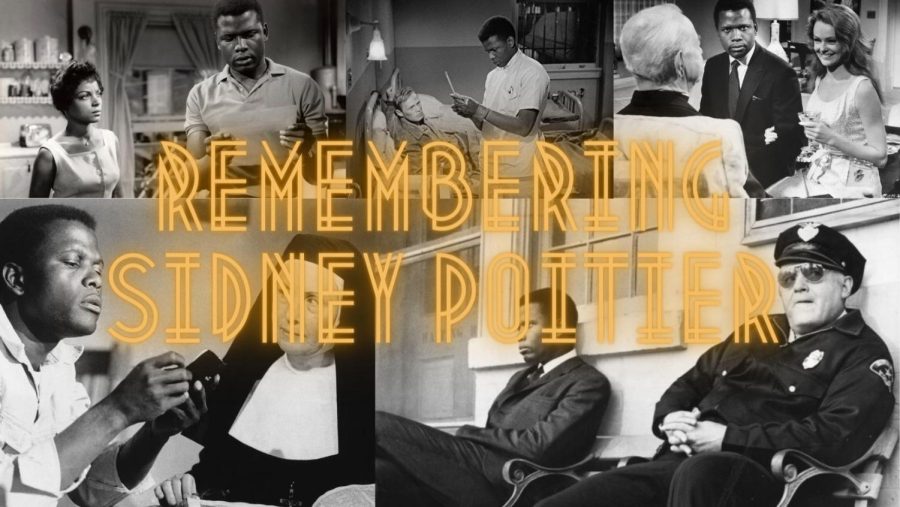Sidney Portier, legend lost
People, IMDb, English Times, Eye for Film, and Oregon Public
Recently, America lost famous actors such as Bob Saget and Betty White. Sadly, early this January Sidney Poitier became another lost legend. Poitier influenced the film industry as an actor, director, trailblazer, and activist for Black and Bahamian people.
January 24, 2022
On January 6th, 2022 the film star and film director Sydney Poitier passed away due to heart failure. Poitier starred in award-winning movies such as “Lilies of the Field”, “A Raisin in the Sun”, and “Guess Who’s Coming to Dinner”. In 1964, he became the first Black person and first Bahamian person to win an Oscar for Best Actor.
During the time of prevalent racial injustice and segregation, he went against the odds and took on roles that went against society’s norm. He used his acting skills to change the way that people negatively perceived African Americans in film and reflected his passion for Black rights through his movies. In the Academy and Golden Globe award-winning movie, “In The Heat of The Night”, Portier took the role of a black police officer who fought racism during a murder investigation. In “Guess Who’s Coming to Dinner”, he played a black man with a white fiancé. He even played a Black doctor to a white criminal man in the 1950 movie “No Way Out”. Of course in these times, people looked down upon interracial couples and Black doctors, but Portier took both roles and made a statement to society. He eventually paved the way for black actors such as Will Smith and Denzel Washington.
“The fact that he was able to establish those kinds of characters on-screen when there was that pressure for African Americans to conform that was his superpower,” tv producer Thomas Allen Harris said.
As a director, he certainly did not disappoint. His most popular movies include the comedy film “Uptown Saturday Night” starring Poitier himself and singer Harry Belafonte, “Stir Crazy” featuring Gene Wilder, and “Let’s Do it Again” with Bill Cosby in 1975. Poitier seemingly knew the ins and outs of the entire film world.
Apart from his roles on the big screen, Portier also fought for both Bahamian and Black rights. He participated in the campaign for Bahamian independence and in 1997 he was appointed as the Bahamian Ambassador to Japan. Portier attended MLK’s March on Washington as a part of his fight for Civil Rights for Black people. He also focused on combating the racial stereotypes that Black people could only play simple roles such as butlers, maids, and chauffeurs in movies.
“I was shocked and saddened by this news [of his death]. He paved the way for so many black actors and actresses and he really made an impact on everyone. He also fought for African American rights which is good and he definitely showed that in his acting. My favorite movie with him is probably A Raisin in the Sun because that was a beautifully written movie about black struggles in the 50s,” magnet junior Jerrica Arnett said.
When it comes to awards and accolades Poitier received a significant amount. In 1995 he received the Kennedy Center Honor and in 2009 President Barack Obama awarded him the Presidential Medal of Freedom. He even received knighthood by Queen Elizabeth II in 1974. For his accomplishments in film, he received the Golden Globe Henrietta Award for World Film Favorite in 1969. He also received the Academy Award for Best Actor in a Leading Role for his role as Homer Smith in Lilies of the Field. For his contributions to the African American community, he received the NAACP Image Hall of Fame Award.
Known by people all across the globe, Poitier impacted everyone who saw him perform. He took a stand for his people and made it a mission to put Black people in a positive light and fight against the stereotypes pent against them. His life meant so much to both the film industry and the Black community.





Cheryl Colin • Jan 26, 2022 at 3:33 PM
Indeed, we can absolutely agree that this young lady hit the mark on “Remembering Sidney Poitier” His name immediately reminds us of several of his films, My favs has always been “Lillie’s Of The Field” and ” They Call Me Mr.Tibbs” , The memories of his accomplishments live in our hearts. Thank You, Ren Lloyd for an Awesome contribution!